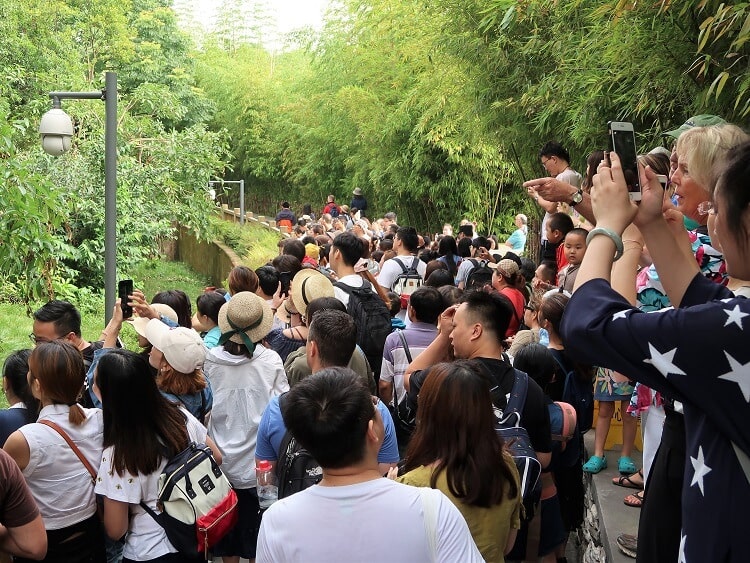I remember my first time in China. I was like a deer in the headlights!
Everything felt wild and confusing at first — but I also fell completely in love with the place. I’ve been back more times than I can count since that first trip.
I’m going to assume this is your first trip to China. Therefore, in this short list, I’ll focus on just the main things you should know before you go.
If you’re after a more in-depth guide, check out my epic 40 China travel tips.
So without further ado, here are my 10 tips for your first trip to China.
1. Use Google Translate

I use this every day in China. Image by Dennizn on Shutterstock.
The language barrier in China can lead to funny and frustrating situations.
All I can say is thank goodness for translation apps!
Google Translate is widely used among tourists (because who doesn’t use Google?), but there are lots of other options.
You’ll find restaurant staff and shop assistants will usually be able to engage in a simple conversation using Google Translate on your phone.
The real-time camera feature is also handy.
It allows you to scan Chinese characters and translate them to another language. It’s awesome for reading menus – even if the translations aren’t always entirely accurate!
Just note that to use Google, you’ll need a virtual private network (VPN) app on your phone, or an eSIM that has an in-built VPN.
As well as a VPN and eSIM, I recommend these travel apps for China to help you get by.
2. Use a VPN or eSIM

Having an eSIM with inbuilt VPN will give you access to Western sites while exploring. Image by Jacob on Pexels.
This is one of my best tips for your first trip to China.
Have you heard of the Great Firewall of China? Basically, it’s a way the Chinese Government blocks citizens from accessing certain online content.
You might think a couple of weeks’ break from Instagram is a good thing. However, the list of apps banned in China is far more extensive than you might have realized.
It includes anything Google related (including Gmail and YouTube), TikTok, Reddit and Dropbox. It also includes most foreign news outlets, and even using WhatsApp in China is problematic for tourists.
Fortunately, the firewall is pretty easy to get around, with the help of a VPN app or an eSIM that includes a VPN. This anonymizes your identity online by masking your IP address and assigning you a temporary IP located in another country.
Unfortunately, not all VPNs work in China.
For an up-to-date list of the ones that do work, check out my helpful and quick China VPN guide or go straight here:
Just note you have to download the VPN before you arrive, as you can’t do it once you arrive.
3. Learn the Chinese version of queuing

Get used to ‘queues’ like this on your first trip to China. Image by Humphery on Shutterstock.
OK, I’m being sarcastic here.
It’s a well-known fact that the Chinese generally don’t line up for anything.
A typical Chinese ‘queue’ resembles a football scrum.
This quirk of daily Chinese life can be pretty stressful and annoying, especially if you’re traveling to China for the first time.
To learn to line up like a local, all you need is a bit of practice and a healthy sense of competition.
Some essential tips:
- Keep close – glue yourself to the person in front and don’t open any gaps, otherwise the second you stop moving, five people will have crammed themselves into the space ahead of you.
- Stand wide and angle your elbows out – I’ve seen plenty of short Chinese women do this to get through the crowds.
- Don’t wait for the cashier to call you – as soon as they’re done serving the person in front of you, go straight up and hand them your money/passport/tickets/whatever.
There’s no need to get aggressive, but asserting your intentions by physical means really isn’t considered rude in China.
4. Pay attention to tones

Getting the tones right is crucial to being understood. Image supplied by Mike Cairnduff.
Are you going to try speaking a little bit of Mandarin while you’re in China?
Most foreign tourists who do try find it difficult to be understood. That’s because Mandarin is a tonal language (changes in speaking pitch), which is an unfamiliar concept to most of us.
If you’re learning basic Mandarin before your first trip to China, absolutely do not ignore the tones.
Even if your pronunciation is dead-on, utter a word without the correct tones to a native Chinese speaker, and you’ll likely receive a blank stare.
If you have time before you leave for your trip, you could learn Chinese online which would give you a confidence boost, especially if you’re going to be traveling on your own.
Have no intention of uttering a word while you’re there? That’s OK – just refer to my first tip and use a translator app.
You might also get a kick out of my article on how to travel in China without any Mandarin skills.
5. Walk away from crowds

The Panda Research Base in Chengdu is always super-crowded. Image supplied by Mike Cairnduff.
Too many crowds at that famous tourist spot? Just walk away!
Any popular attraction in China is bound to draw in huge crowds of domestic tourists.
The best strategy for avoiding crowds is visiting when the attraction opens, or at the end of the day. You should also avoid national holiday periods.
If you’re on a package tour though, you probably won’t have a choice. Sometimes you’ll arrive at the exact same time as 10 busloads of excitable local tourists.
But this isn’t always the huge problem it’s made out to be. The values of a typical Chinese group tourist are different to most crowd-averse Western tourists.
Rarely do the selfie-stick wielding masses wander far from the tour bus, their group, or the main path.
I’ve always found that if you walk a few minutes away from the madness in any direction, the crowds all but disappear. The Chinese don’t like to hike or walk long distances.
Of course, depending on the tourist attraction in China, this doesn’t always work. But you’d be surprised how often it does.
6. Set up your digital payments

They will scan you, or you can scan them. Image by Freer on Shutterstock.
Everyone in China uses digital payment apps – mostly WeChat Pay and Alipay.
You can too by downloading one or both of the apps and linking your local bank card.
If you’re not digitally savvy, or you don’t want to hand over your personal details (including your passport as part of the registration process), you’ll need to use cash in China.
But this will be a pain, as many small vendors don’t accept 100 yuan notes, and that’s all the ATMs spit out. So, bring some low denomination cash (yuan) with you if you can.
I highly recommend using Alipay or WeChat Pay though. It will make life so much easier.
If you’re interested, here are all the major apps that the Chinese use.
7. Take care when crossing the road

Pedestrian crossings in China are a free-for-all. Image by J. Lekavicius on Shutterstock.
It might sound obvious, but hear me out on this.
I’ve seen horrible accidents and near-misses while living in different provinces in China.
There’s only one road rule in China, and that’s “size matters”. Trucks and cars are king!
Pedestrians? Bottom of the pecking order.
While pedestrians may use zebra crossings, many motorists regard them as decorative paint. Stopping at them is completely optional.
Traffic light crossings tend to have a slightly better strike-rate when it comes to cars actually stopping, but even a green pedestrian light doesn’t guarantee right of way.
A red light means nothing to a Chinese motorist on a mission. It’s always up to you to get out of the way.
So, how do you cross a Chinese road and survive?
My best advice is to seek safety in numbers. Cross in a group whenever you can.
8. Prepare for smoking and spitting

Lots of people smoke in China, particularly older men. Image supplied by Mike Cairnduff.
Free-range spitting in China, and smoking indoors even more so, are two things I couldn’t get used to during my first time in China.
Even after living in China, I still couldn’t get used the smoking (having undiagnosed asthma didn’t help!).
If you can prepare yourself for how common these practices are beforehand, experiencing them first-hand hopefully won’t come as such a shock.
The combination of tobacco smoke and pollution contributes to the common Chinese pastime of hocking up phlegm onto footpaths, along with the traditional belief that “out is better than in”.
As a foreigner, you’ll find this pretty gross. But remember, every culture has its own idea of ‘normal’.
For example, blowing your nose into a handkerchief and stuffing it back into your pocket is considered disgusting by the Chinese. Just sayin!
9. Get the right visa

Visa rules can be confusing when visiting China for the first time. Image supplied by Mike Cairnduff.
Make sure you do a little research on Chinese visas and whether you even need one.
I recommend you refer to my guide for getting a visa for China.
If you have a passport from one of about 50 countries, you can enjoy visa-free entry for up to a month.
This means no visa expense and no icky paperwork. Yay!
But even if you’re not from one of the ‘lucky’ countries, you might still be eligible for visa-free transit for up to 144 hours (six days). You just need to be transiting through China on the way to another country.
For instance, your itinerary is something like this: Los Angeles – Shanghai (China) – Tokyo (Japan) – Los Angeles, i.e. your flight is USA to Japan, transiting in China.
See also: Flight time from USA to China
10. Don’t tip

Enjoy your Chinese beer without handing over extra money. Image supplied by Mike Cairnduff.
My last tip: don’t tip.
Chinese people don’t ever tip.
(This is one of many Chinese culture examples I’ve compiled, if you want to dive deeper before your trip.)
Sadly though, tipping has become a thing on some foreigner-only tours where they will:
- Let you know beforehand that the tour doesn’t include gratuities
- Remind you on the bus that you should cough up a few extra yuan.
Even still, you can just hand over a small amount – there’s no percentage requirement like in the US.
I talk more about this in my article on tipping in China.
So, enjoy that Chinese beer at the bar, folks!
You can rest assured there’s nothing extra to hand over.
I hope you got a nugget or two from my essential tips. As I mentioned at the start, you should also check out my ultimate list of China travel tips. You’ll be a China travel guru in no time!
Main image credit: Supplied by Mike Cairnduff.
FAQ about visiting China for the first time
Where should I go for the first time in China?
Most tourists head to Beijing to see The Great Wall of China or to Shanghai for the shopping and food. I’d recommend also getting a bit further out to experience different cultures, such as Yunnan and Guangxi provinces.
What is China like for tourists?
In a few words, I’d say it’s safe, fun, culture-rich and different to what you’d expect!
Is China expensive as a tourist?
Not really, as long as you eat mostly local food and stay at budget or moderate hotels. How far your money goes depends on your currency conversion.












